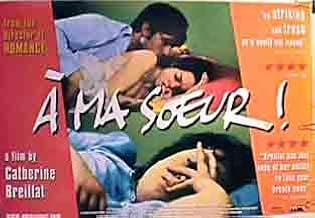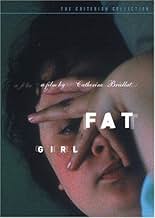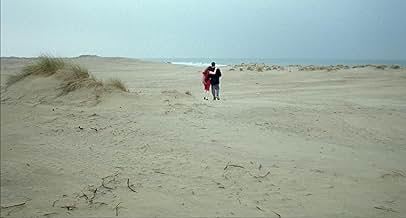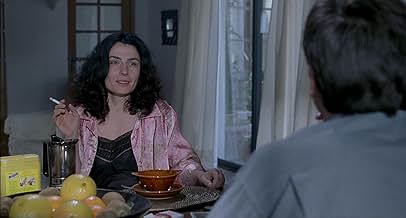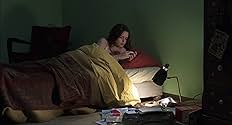AVALIAÇÃO DA IMDb
6,4/10
14 mil
SUA AVALIAÇÃO
Duas irmãs comparam suas atitudes e experiências sexuais durante as férias em família.Duas irmãs comparam suas atitudes e experiências sexuais durante as férias em família.Duas irmãs comparam suas atitudes e experiências sexuais durante as férias em família.
- Direção
- Roteirista
- Artistas
- Prêmios
- 4 vitórias e 3 indicações no total
Claude Sésé
- Police Officer
- (as Claude Sese)
Avaliações em destaque
Directed by the 'controversial' Catherine Breillat (she showed a hard-on in her last movie, 'Romance'), the story revolves around a family on holiday with two adolescent sisters, the chubby 13 year old Anaïs (played by Anaïs Reboux) and the rather more svelte Elena (Roxane Mesquida) who is two years her senior, although rather less mature. Both girls are still virgins, although Elena is clearly aware of the power of her beauty over the opposite sex. Effortlessly she pulls Italian law student Fernando (Libero De Rienzo, with whom she begins an intense relationship. Fernando talks of love, but is obviously keen for sex. Poor Anaïs is unfortunately sharing a room with the pair as they fumble towards a deflowering. Indeed, this is one of the most beguiling scenes in the movie; you feel awkward bearing witness to what is going on - the constant demands of Fernando for 'a demonstration of love', which after refusals brings forth the sorts of coercing phrases regarding anal sex that so many girls must dread to hear.
The animosity is often intense between the sisters, Anaïs' bitterness towards her sister combined with a resigned maturity that only rejection and frustration can breed. But at the same time there are wonderful scenes of the two sharing sisterly moments; albeit with bile never far away. The point is well made, the bond is there, no matter how much of a bitch Elena can be. Anaïs is such a lost, sad character; the melancholic beauty of one scene on the beach where she is singing to herself whilst Elena and Fernando 'make out' is incredible. Also well portrayed is the relationship with the parents. Mother is very much like Elena; Father is a workaholic who hates holidays and returns home before the others. Although the parents are mostly secondary in the story, you sense that they tend to reinforce Anaïs insecurities and knock her down further. This is exemplified in the scene the morning after the first Elena & Fernando night together. Anaïs is clearly really low, crying and choked. Her parents offer zero warmth, the only solace coming from a still caustic Elena shoving bread into her mouth to comfort her.
The story climaxes as the sisters and their mother return home from their holiday, after a gloriously comic scene where Fernando's mother (Laura Betti) visits to reclaim a precious ring that he had given to Elena as an engagement ring. The journey toward home is fantastically shot; the claustrophobia of motorway driving - especially since the mother doesn't like driving, and is pretty p****d at Elena's antics and Anaïs' miserableness - metaphoring the unease between the three, even more so as night wears on and mother becomes more wary of the huge dangerous lorries that she overtakes incautiously on the freeway. If I was an absolute ponce (or totally fearless), I would say these trucks are a metaphor for the male predatory sexuality against the tiny feminine car (which still manages to nimbly overtake at will most of the time). But I'm not (?), so I won't. Anyway, the ending comes as a huge shock. So I'm not going to tell you it. But safe to say you don't leave the cinema with a laugh and a giggle.
Overall, I was actually surprised by how deep this story was; there was only one gratuitous erection, and even that was covered by a condom. A brave attempt to analyse adolescent female sexuality, often leaving an unplesant taste in the mouth, but well worth a go if you're in the mood.
The animosity is often intense between the sisters, Anaïs' bitterness towards her sister combined with a resigned maturity that only rejection and frustration can breed. But at the same time there are wonderful scenes of the two sharing sisterly moments; albeit with bile never far away. The point is well made, the bond is there, no matter how much of a bitch Elena can be. Anaïs is such a lost, sad character; the melancholic beauty of one scene on the beach where she is singing to herself whilst Elena and Fernando 'make out' is incredible. Also well portrayed is the relationship with the parents. Mother is very much like Elena; Father is a workaholic who hates holidays and returns home before the others. Although the parents are mostly secondary in the story, you sense that they tend to reinforce Anaïs insecurities and knock her down further. This is exemplified in the scene the morning after the first Elena & Fernando night together. Anaïs is clearly really low, crying and choked. Her parents offer zero warmth, the only solace coming from a still caustic Elena shoving bread into her mouth to comfort her.
The story climaxes as the sisters and their mother return home from their holiday, after a gloriously comic scene where Fernando's mother (Laura Betti) visits to reclaim a precious ring that he had given to Elena as an engagement ring. The journey toward home is fantastically shot; the claustrophobia of motorway driving - especially since the mother doesn't like driving, and is pretty p****d at Elena's antics and Anaïs' miserableness - metaphoring the unease between the three, even more so as night wears on and mother becomes more wary of the huge dangerous lorries that she overtakes incautiously on the freeway. If I was an absolute ponce (or totally fearless), I would say these trucks are a metaphor for the male predatory sexuality against the tiny feminine car (which still manages to nimbly overtake at will most of the time). But I'm not (?), so I won't. Anyway, the ending comes as a huge shock. So I'm not going to tell you it. But safe to say you don't leave the cinema with a laugh and a giggle.
Overall, I was actually surprised by how deep this story was; there was only one gratuitous erection, and even that was covered by a condom. A brave attempt to analyse adolescent female sexuality, often leaving an unplesant taste in the mouth, but well worth a go if you're in the mood.
At the NY Film Festival's Q&A with Breillat, she expressly forbid seeing "Fat Girl" (as she prefers to call it) as a morality play. She eluded any attempts to draw her into conclusions about her film, insisting that she is not a moralist.
What is clear from the questions she asks, however, is that she views sex with a certain contempt, especially as regards the male role in the act. The men that are in the film are either insensitive, duplicitous or murderous. Breillat's intent is to show how adrift any adolescent girl is when it comes to sexuality and to somehow convey that to an adult audience. She counseled young Anais during filming by saying, "We are making a film that I don't even think you can see when it is done, but it is not for you. It is supposed to scare adults."
What is clear from the questions she asks, however, is that she views sex with a certain contempt, especially as regards the male role in the act. The men that are in the film are either insensitive, duplicitous or murderous. Breillat's intent is to show how adrift any adolescent girl is when it comes to sexuality and to somehow convey that to an adult audience. She counseled young Anais during filming by saying, "We are making a film that I don't even think you can see when it is done, but it is not for you. It is supposed to scare adults."
Director Breillat is back and, as she did with "Romance", pushing the bounds of censorship in an intellectually challenging fashion. The story follows the sexual development of two sisters in their early teens. Their middle class family embody the usual social mores and protective attitudes. Moreover, the story makes us aware of the legal dilemma of under age sex, undertaken as a matter of conscious choice and with proper protection by the 15-year old (older) sister with a boyfriend only a few years her senior (ie the relationship would be legal in Netherlands but not in many countries, including France). These are two fairly "normal" sisters, although the younger one is excessively overweight and only fantasizes about getting a boyfriend. There is some possible interpretation that the 15-year old's psychological development would progress more soundly were she not (initially) fettered by taboos over her own virginity. In one scene, a TV in the background has a Breillat-type character being interviewed and giving her philosophy about the intrinsic nature of sex, how it is something common to us all and that can be understood by anyone, and that we are all alike inasmuch as no-one is perfect. The characters and scenes are painted brilliantly, the sibling rivalry coupled with intense sisterly bonding, the mother driving at night and, as many people will have, with a lack of sleep and so not as perfectly safely as normal. It is the realism and ordinariness of the situations that keep us on the edge of our seats. The dialogue has the realism that suggests youngsters may have suggested some of the lines, with their observations that have the power to startle us out of complacency. The use of actors so young in fairly explicit scenes will be a matter of great concern, but Breillat is serious about her work and convinces us that she is not pandering to sensationalism but raising valid questions about how we effectively handle the challenges presented by precocious adolescents. The film is more polished than Breillat's earlier work and has an unnerving denouement, well-delivered.
Well, I am not sure why director made the decisions she did regarding the last 15 minutes of the film. She seems to have taken a page out of Claude Chabrol's textbook, which may have been a good thing but here it feels rather forced. The film seems to be a "Last Tango in Paris" for teenagers, as a young man from Italy takes up with a French girl who has a love/hate relationship with her fat sister (the title character). As Brando did with Maria Schidner, the Italian guy uses the word 'love' to exploit the girl sexually. The good acting makes the film work, until the part I have qualms. I am not sure the credit fully belongs to the director, but like Larry Clark's "Kids," the result is a profound statement about the cruelty of adolescence. We certainly empathize with the title character, and therefore it is harder to accept certain aspects of this film. The film is one of several French films in recent years with a brutal, pessimistic tone, including "The Dreamlife of Angels" and "demonlover." This film is far better than the director's awful mess "Romance." I can see why some people either really admired or loathed this film. Objectively, no one can take away from the great acting and solid cinematography and for that reason I choose to give it 3 stars as opposed to 2 and a half.
Moviezone Award Jury rapport 2002 - Fat Girl (Catherine Breillat)
The winning film amongst three fantastic films has got to be a very special feature. Catherine Breillat showed the jury the world of two sisters which do not only differ in the physical aspect of their characters but also have their own very distinctive expectations and desires when it comes to their first time having sex. The bond between the sisters is portrayed very well, the girls and the life they live are very recognizable. When you are watching the film you forget you are watching actresses when they flawlessly get across very strong and personal emotions in a very subtle manner. The observations of the fat girl show precisely how she encounters her sisterhood; her negative self-image and the absurd fascination for her sister. The strong hand of the director and the personal theme makes Fat Girl a film which will be remembered for a long time and which will be the subject of many discussions.
The winning film amongst three fantastic films has got to be a very special feature. Catherine Breillat showed the jury the world of two sisters which do not only differ in the physical aspect of their characters but also have their own very distinctive expectations and desires when it comes to their first time having sex. The bond between the sisters is portrayed very well, the girls and the life they live are very recognizable. When you are watching the film you forget you are watching actresses when they flawlessly get across very strong and personal emotions in a very subtle manner. The observations of the fat girl show precisely how she encounters her sisterhood; her negative self-image and the absurd fascination for her sister. The strong hand of the director and the personal theme makes Fat Girl a film which will be remembered for a long time and which will be the subject of many discussions.
Você sabia?
- CuriosidadesA man was arrested by Canada Customs and Revenue Agency in July of 2003 for importing a copy into Canada, on the grounds that the movie constituted obscene material.
- Erros de gravaçãoTodas as entradas contêm spoilers
- Citações
Anaïs Pingot: When I hate you, I look at you and then I can't.
- Versões alternativasWhen released on home video in the UK, this title was cut by 1 minute and 28 seconds to cut down a scene of sexual assault. Ireland banned it altogether.
- Trilhas sonorasSocial Climber
Performed by Laura Betti
Principais escolhas
Faça login para avaliar e ver a lista de recomendações personalizadas
- How long is Fat Girl?Fornecido pela Alexa
Detalhes
- Data de lançamento
- Países de origem
- Centrais de atendimento oficiais
- Idiomas
- Também conhecido como
- Mi hermana virgen
- Locações de filme
- Empresas de produção
- Consulte mais créditos da empresa na IMDbPro
Bilheteria
- Faturamento bruto nos EUA e Canadá
- US$ 725.854
- Fim de semana de estreia nos EUA e Canadá
- US$ 31.237
- 14 de out. de 2001
- Faturamento bruto mundial
- US$ 765.705
- Tempo de duração1 hora 35 minutos
- Cor
- Mixagem de som
- Proporção
- 1.85 : 1
Contribua para esta página
Sugerir uma alteração ou adicionar conteúdo ausente


![Bande-annonce [OV]](https://m.media-amazon.com/images/M/MV5BNTU0ZWE0ODAtMGUwMS00NWRhLTg1NjUtMTFlNTYxOWFiMzhlXkEyXkFqcGdeQXRyYW5zY29kZS13b3JrZmxvdw@@._V1_QL75_UX500_CR0)



